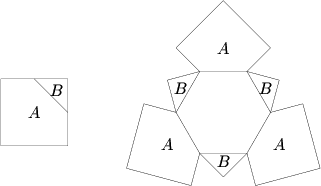Difference between revisions of "1985 AIME Problems/Problem 15"
| Line 1: | Line 1: | ||
== Problem == | == Problem == | ||
Three 12 cm <math>\times</math>12 cm [[square (geometry) | squares]] are each cut into two pieces <math>A</math> and <math>B</math>, as shown in the first figure below, by joining the [[midpoint]]s of two adjacent sides. These six pieces are then attached to a [[regular polygon | regular]] [[hexagon]], as shown in the second figure, so as to fold into a [[polyhedron]]. What is the [[volume]] (in <math>\mathrm{cm}^3</math>) of this polyhedron? | Three 12 cm <math>\times</math>12 cm [[square (geometry) | squares]] are each cut into two pieces <math>A</math> and <math>B</math>, as shown in the first figure below, by joining the [[midpoint]]s of two adjacent sides. These six pieces are then attached to a [[regular polygon | regular]] [[hexagon]], as shown in the second figure, so as to fold into a [[polyhedron]]. What is the [[volume]] (in <math>\mathrm{cm}^3</math>) of this polyhedron? | ||
| + | |||
| + | [[Image:AIME 1985 Problem 15.png]] | ||
== Solution == | == Solution == | ||
Revision as of 02:31, 21 January 2007
Problem
Three 12 cm ![]() 12 cm squares are each cut into two pieces
12 cm squares are each cut into two pieces ![]() and
and ![]() , as shown in the first figure below, by joining the midpoints of two adjacent sides. These six pieces are then attached to a regular hexagon, as shown in the second figure, so as to fold into a polyhedron. What is the volume (in
, as shown in the first figure below, by joining the midpoints of two adjacent sides. These six pieces are then attached to a regular hexagon, as shown in the second figure, so as to fold into a polyhedron. What is the volume (in ![]() ) of this polyhedron?
) of this polyhedron?
Solution
Note that gluing two of the given polyhedra together along a hexagonal face (rotated ![]() from each other) yields a cube, so the volume is
from each other) yields a cube, so the volume is ![]() .
.










